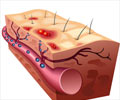Older adults are encouraged to take shingles vaccination to prevent complications from the disease.

‘Older adults are encouraged to take shingles vaccination to prevent complications from the disease.’





There has been scientific speculation that such inflammation may increase a person’s risk of dementia. However, a new study has found that shingles is not associated with an increased risk of dementia. The study has been published in the online issue of Neurology®, the medical journal of the American Academy of Neurology.
“As a person’s age increases, so does their risk of dementia, and it’s important to determine which factors may contribute to this risk,” said study author Sigrun Alba Johannesdottir Schmidt, MD, PhD, of Aarhus University Hospital in Denmark. “Shingles most often affects people over age 50. The good news is that our study found it does not seem to increase a person’s risk for dementia.”
Is There a Link Between Shingles and Dementia?
For the study researchers reviewed Danish medical registries. Over a 20-year period they identified 247,305 people who had visited a hospital for shingles or were prescribed antiviral medication for shingles and 1,235,890 people matched for age and sex who did not have the disease. The average age was 64.Researchers then determined which participants developed dementia up to 21 years after their shingles diagnosis. Of people who had shingles, 9.7% developed dementia. Of people who did not have shingles, 10.3%, developed dementia.
After adjusting for other health conditions such as diabetes, cancer and traumatic head injury, researchers found that people with shingles had a 7% lower risk of dementia than people who did not have shingles.
Advertisement
Researchers did find that people who had shingles that had spread to the central nervous system had nearly twice the risk of developing dementia. However, Schmidt said such complications are rare affecting below 0.1% of those with shingles.
Advertisement
The study was supported by the Edel and Wilhelm Daubenmerkls Charitable Foundation.
Source-Eurekalert















